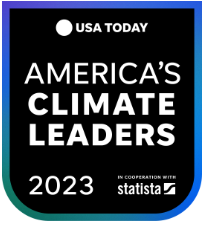Addressing the Climate Challenge
Water is integral to the health of communities everywhere. Our products and solutions help address various effects of climate change on the water cycle, such as shifts in precipitation patterns due to a warming atmosphere.
While the ADS business model directly addresses water-related climate risks, we are also focused on making our internal operations, procedures and policies more responsive to this global challenge. We are committed to monitoring and managing climate-related risks and opportunities related to our business strategy, product solutions and operations.

Our Climate Ambition
We have committed to setting and achieving Science Based Targets for reducing greenhouse gas emissions, along with broader efforts to improve efficiency and reduce environmental impact across our company. We back this up with robust data collection.
Direct GHG emissions from ADS operations decreased 4.6% in Fiscal 2024, primarily due to the reduction in fuel consumption by the ADS fleet. Indirect energy emissions decreased 4.6% (Market Based) and 4.1% (Location Based), primarily due to the decrease in manufacturing volume.
We are committed to the SBTi for greenhouse gas emissions in line with limiting global temperature rise to 1.5°C. In Fiscal 2024, we continued engaging with the SBTi and formally submitted our targets for approval, which is anticipated in Fiscal 2025.
In accordance with the Paris Climate Accord, ADS submitted a letter of intent signaling our commitment to science-based targets for GHG emissions in April 2022. In Fiscal 2024, ADS submitted proposed SBT to the SBTi for approval.
In Fiscal 2024, ADS continued to track energy and emissions data from our U.S. and Canada operations on a facility level.
Approximately 99% of our energy is consumed in the manufacturing processes. ADS continues to evaluate opportunities to reduce our energy consumption through adopting more efficient technologies throughout our manufacturing footprint and reducing scrap and improving equipment effectiveness.
In Fiscal 2024, purchased electricity decreased 6% and purchased natural gas decreased 13.6%
As a participant in the Smartway program established by the United States EPA, ADS is making our freight transportation more fuel-efficient by continuously optimizing vehicle use, fleet routes and shipping methods to meet our efficiency goals.
Fuel economy was flat in Fiscal 2024 compared to the prior year as we believe we are near peak MPG with our current fleet assets. Through our fleet modernization effort, ADS purchased 150 new trucks in 2024 which will allow us to retire older less efficient models. The new trucks will have automatic manual transmissions that employ predictive shifting to deliver peak performance and fuel economy.
We believe there is further opportunity to improve fleet efficiency through adoption of additional technology solutions such as active tire monitoring and self-inflation capabilities, managed maintenance programs and training to reduce idle time, improve MPG and maximize engine efficiency.
Climate-Related Risks and Opportunities
Managing Climate-Related Risks
The transition to a low-carbon economy can raise several risks for our industry. As such, preparing for these potential impacts is important to our overall business.
From a regulatory standpoint, the potential introduction of CO2 prices, limits on emissions and stricter environmental standards may introduce additional costs to our manufacturing processes and to our fleet. Further, potential shifts in the demand and supply of our key raw materials, including recycled and virgin plastic, could impact the cost of doing business.
In the short term, the physical risks associated with climate change, such as extreme weather events and changes to weather patterns may lead to disruptions in our supply chain, the transportation of our products and potential slowdowns in revenue. Over the long term, however, our products and services can protect communities against weather risks.
Seizing Climate-Related Opportunities
We believe our water management solutions can help mitigate some of the most damaging effects of climate change. Our stormwater management solutions are paramount to reducing water runoff, improving water quality and preserving water in communities facing extreme weather events. We can help governments, contractors and engineers reduce their carbon footprints with more energy efficient solutions.
Our manufactured products are more energy efficient than traditional materials, requiring less heavy machinery during installation and fewer deliveries per jobsite. Most importantly, ADS' plastic pipes have a lower manufacturing carbon footprint than traditional reinforced concrete and corrugated steel pipes.
Finally, the transition to a low-carbon economy also presents meaningful operational opportunities for ADS. We can improve efficiency through reducing downtime and minimizing scrap. Our logistics and transportation initiatives are increasing payload efficiency and reducing fleet miles per gallon. We can not only reduce our carbon footprint, but also cut future operating costs.
| Transition Risks and Opportunities | Examples of Relevant Trends and Developments | Impacts to ADS Transition Opportunities |
|---|---|---|
| Policy, Legal, and Regulatory |
• Increased regulatory reporting requirements • CO2 prices • Phasing out of fossil fuel subsidies • Emission limits • Introduction of strict environmental standards for industrial plants and buildings • Policies to support recycling • Support for electric mobility, energy efficiency and alternative fuels in transportation |
ADS Manufacturing Risks: We may face a potential increase in the cost of operations and capital expenditures due to higher carbon prices and the additional costs associated with fitting plants and buildings to meet environmental standards. Opportunities: We may use policy incentives to shift towards lower- emission energy sources. Capital investments in greener equipment, machinery and facilities will result in more energy-efficient operations. ADS Fleet Risks: Transportation-related policies may lead to a potential increase in costs related to improving fuel efficiency of our fleet, or could lead to current fleet being regulated out in certain geographies. Opportunities: Our efforts to improve the fuel efficiency of our fleet may result in improved network optimization. Demand for ADS Products Opportunities: With recycled plastics making up 60 percent of our raw pipe materials, we are in a strong position to benefit from an increased demand of recycled material products. Higher environmental standards for buildings and infrastructure may also increase demand for our products. ADS Corporate Risks: We may face costs associated with increased reporting obligations. We may be exposed to litigation related to resin pellets by suppliers. |
| Transition Risks and Opportunities | Examples of Relevant Trends and Developments | Impacts to ADS Transition Opportunities |
|---|---|---|
| Market |
• Shifts in demand of our products and services • Shifts in supply and demand of raw materials, including plastic (a petroleum- based product) • Shifts in supply and demand of transportation fuel |
ADS Manufacturing Risks: We may face increased cost of raw materials (virgin and recycled plastic); decreased availability of recycled material. ADS Fleet Risks: We may face increased cost of fuel. Demand for ADS Products Opportunities: We believe there is a significant opportunity to partner with governments and communities as our products are part of the climate-change mitigation solution. As we seek opportunities in new markets to diversity and better position our company in the transition to a lower- carbon economy, we may capitalize on public-sector incentives related to our offerings. Our products and services are, by design, more energy efficient than traditional materials, requiring less heavy material and fewer deliveries per job site. While plastic is a petroleum-based product, it has a lower carbon footprint compared to incumbent pipe materials. ADS Corporate The growing market for sustainable investments may create additional financial opportunities for our company as our products address key climate-related challenges. |
| Transition Risks and Opportunities | Examples of Relevant Trends and Developments | Impacts to ADS Transition Opportunities |
|---|---|---|
| Technology |
• Changes in technologies that support the transition to lower- carbon and energy- efficient products
|
Opportunities: Our existing products constitute the lower-carbon and energy-efficient alternatives on the market. We will continue to monitor for new technologies and materials that allow for further carbon footprint improvements and energy savings. We plan to develop adaptive capacity to respond to changing market needs through new product development.
|
| Transition Risks and Opportunities | Examples of Relevant Trends and Developments | Impacts to ADS Transition Opportunities |
|---|---|---|
| Reputational |
• Reputational risk tied to changing customer or community perceptions
|
Risks: We recognize the climate-related risks associated with the use of plastic as a potential reputational risk. Opportunities: We are deliberate in our efforts to use recyclable materials in our production and manufacturing, and to source our raw materials in a responsible manner.
|
| Transition Risks and Opportunities | Examples of Relevant Trends and Developments | Impacts to ADS Transition Opportunities |
|---|---|---|
| Acute Risk |
• Increased severity of weather events, such as cyclones, hurricanes and floods
|
ADS Manufacturing Risks: We may need to allocate additional capital expenditures to secure our facilities from extreme weather conditions. We may face supply chain interruptions, as extreme weather events may cause shortages. ADS Fleet Risks: We may face disruptions to transportation availability. Demand For ADS Products Risks: Market disruptions may result in short-term revenue slowdowns. Opportunities: Our products serve as direct solutions to addressing the physical impacts of climate change. Therefore, we see a
significant opportunity for increased demand for our products and services over the long term. |
Stormwater Events
As the climate warms, the amount of water available to be stored in the atmosphere increases, causing more intense precipitation and more frequent severe storms. As shown in the following chart, the frequency of billion-dollar stormwater management related disasters, particularly severe storms, is increasing. In 2023, there were 27 stormwater-related natural disasters in the United States that cost an estimated $88 billion. If we look back twenty years, there were just six events in 2003.
ADS’ stormwater products help communities keep their residents safe from flooding and other problems associated with increased rainfall. We believe that by taking proactive steps, we can increase our positive impact through enhancing stormwater management in communities nationwide.
America’s Climate Leaders, USA Today

USA Today included ADS on its annual list of America’s Climate Leaders for our efforts to reduce greenhouse gas emissions. Recycling more than a half-billion pounds of plastic every year helps ADS reduce emissions by more than 660 million pounds — equivalent to taking 63,000 cars off the road.
